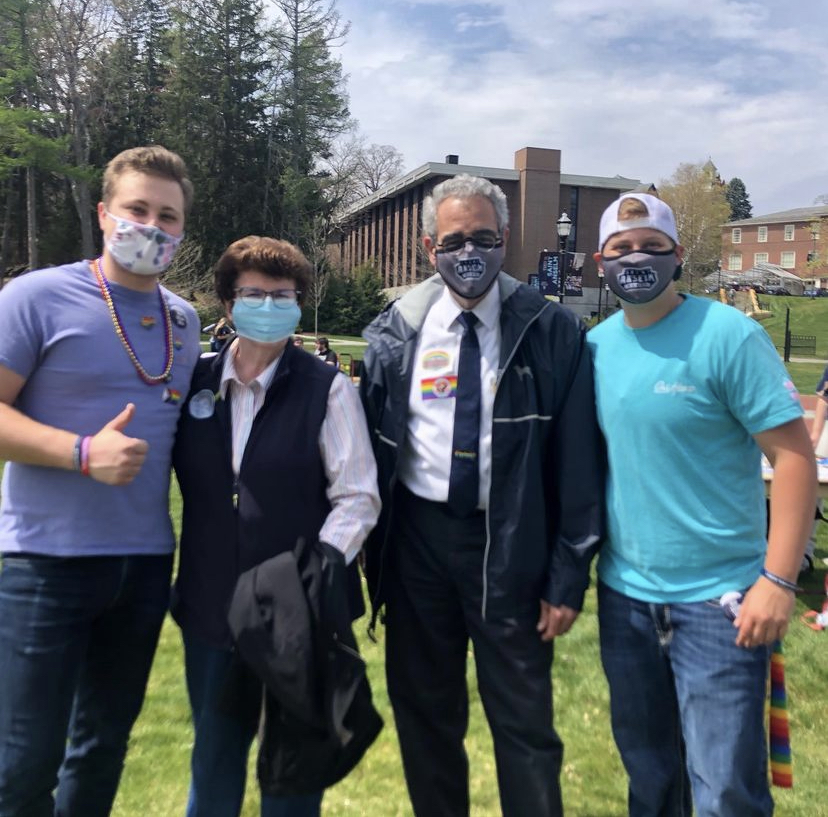TEDA Panel gives LGBTQIA+ student voice to share experiences
Courtesy/@ANSELMTEDA (Instagram)
Dean Finn and President Favazza pose with students at TEDA’s Visibility Day 2021
April 2, 2022
The True Equality and Dignity Alliance’s job is to create a safe space for LGBTQIA+ identifying students on the Saint Anselm College campus. Events such as a student panel, sponsored by Res Life in partnership with TEDA, are an significant part of this mission.
The panel was made up of five LGBTQIA+ identifying students and attended by students, faculty, and admin. Moderated by Wayne Currie, the event began with a list of prepared questions and then opened the floor to questions from attendees. This format made space not only for queer students to find solidarity with panel members, but also for enthusiastic allies to ask questions about how best to support the LGBTQ+ community on campus.
Currie, director of the Intercultural Center, has moderated the panel since the first event about four years ago. Regarding attendance at this year’s panel, Currie said, “The attendance this year was great. It was great to see a lot of staff and faculty as well as students.” He added that “Each year the panel is different” since “the panel is based on the student’s comfort level.”
When asked whether or not the level of acceptance for the queer community at Saint Anselm College has changed over the past four years, panelist Sean Thompson (a senior) answered that overall, campus has become more accepting. He added that TEDA now has a large number of partners across campus, including the Multicultural Student Coalition and the Gender Studies department.
Panelist Rebekah Larson, also a senior, shared that her feelings about the changing culture at the College are “bittersweet.” She said that while it’s wonderful to see the campus become more open and accepting, this sometimes means that people don’t see a need for TEDA as an organization anymore.
However, TEDA is still very much needed on campus, as demonstrated in Larson’s answer to a subsequent question. When asked to describe positive or negative experiences at the College due to her identity as a queer person, Larson mentioned articles published on campus that described LGBTQ people as promiscuous and used harmful terms to describe the community. She also said that, particularly near the beginning of her time on campus, she frequently heard the f-slur used.
However, Thompson described an “overall positive” experience on campus as an openly gay man. He said that he received a wonderful response from his friends, who understood that his sexuality did not fundamentally change who he was as a person.
Given the traditional Benedictine Catholic values of the College, one might wonder about the intersection between the on-campus queer community and the thriving religious life. One of Currie’s last questions to the panelists was, “How do you find a balance between religion and your experience as a queer person?”
An anonymous panelist answered honestly that they were “Excited to move forward and find out what I think, but grieving a really tough loss,” referring to the incompatibility between the faith they were raised with and their experience as a queer person.
A faculty member in attendance raised the important question of labels – saying that they have been asked why each of the identities in the term “LGBTQIA+” is important and that they were interested in learning how best to respond to that question. Why are all of the labels necessary and why is it important that they are all included?
Given that the phrase “LGBTQIA+” is considered an umbrella term, encompassing a multitude of queer identities, Thompson said that, if unsure why a certain label matters to a person, to simply have an open conversation with them about the words they choose to describe themselves. Larson said, “Using those terms [the terms that she used to refer to herself] make me feel valid, but as long as the ‘plus’ is included, that term is very inclusive to everyone.”
When asked for advice for someone who might be struggling with their identity, Larson said, “Your identity is about you, not anyone else.” TEDA aims to provide space on campus for students to explore and express these identities, and in Currie’s words “these events allow the community to capitalize on the rich education and growth that is found in this type of active exchange about multiple identities within our community.” He added that he hopes to see “a sense of awareness, understanding, support and allyship” grow on campus, and events such as the panel and Visibility Day (scheduled for April 29th) are crucial to this.



